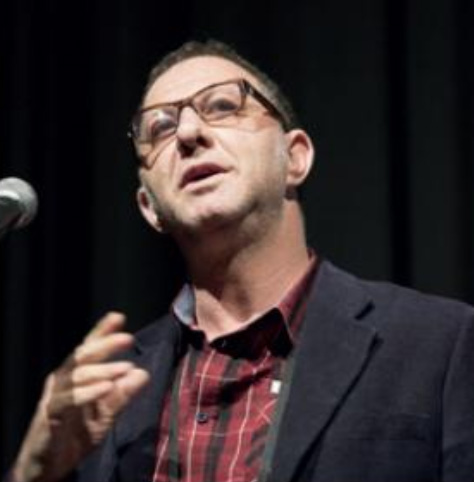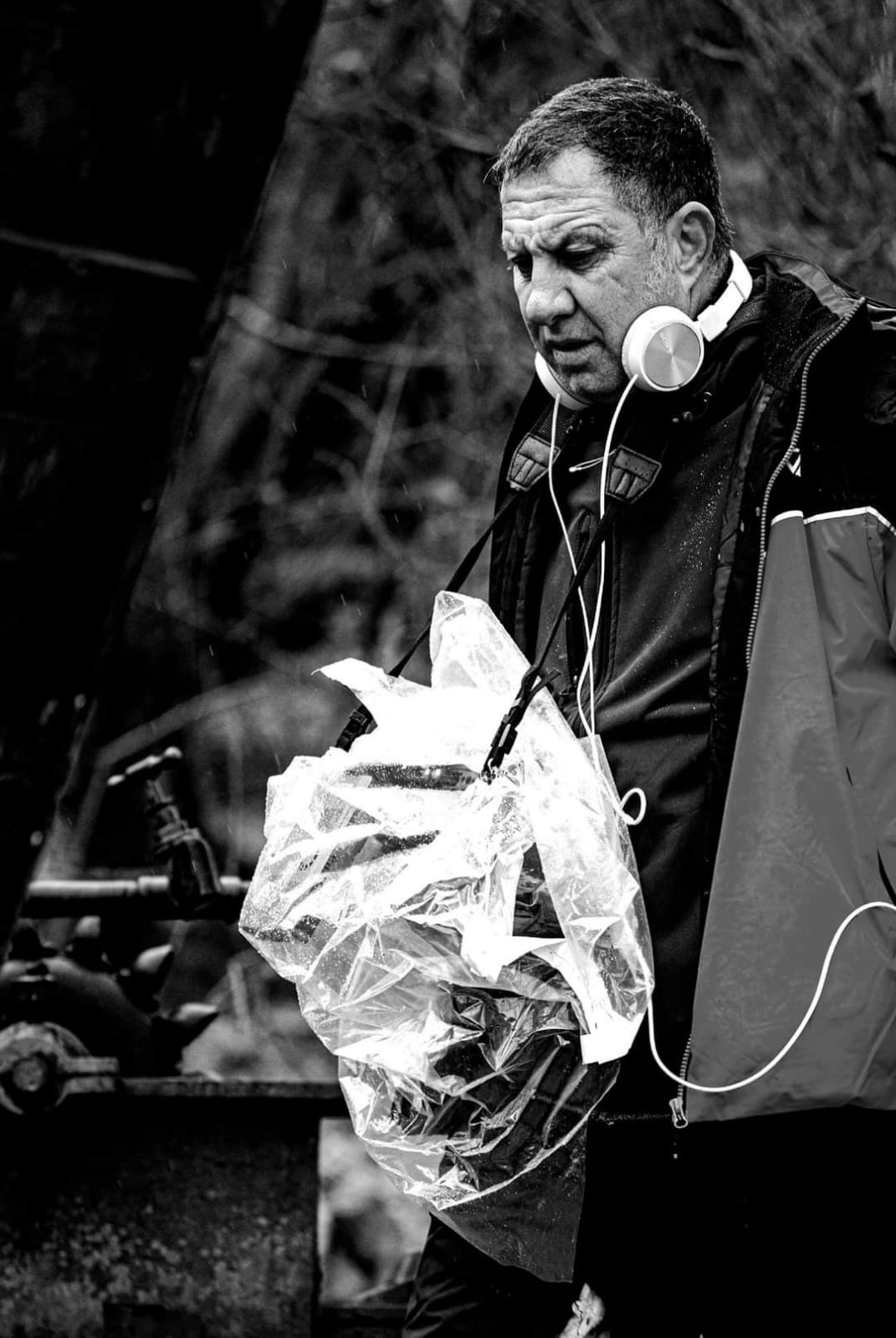Ilan Moskovitch
My name is Ilan Moskovitch and I am a filmmaker. I have been in the film industry for over 25 years, producing documentaries and feature films. I am also a documentary director a casting director, artistic consultant and acting teacher.
I was born and raised in the city of Acre, a very ancient city, about 4,000 years old, which was predominantly an Arab city, before the establishment of the State of Israel in 1948.
I was born on August 3, 1966, the second child to my parents Anna and Meir Moskovitch, who immigrated to Israel from Romania, about two years before I was born. My eldest and only sister Ariela was born in Romania. I was the first child born within the State of Israel in the family. My parents were Holocaust survivors and went through the hardships of World War II. When they immigrated to Israel, they worked hard to survive. My mother worked as an assistant in a kindergarten and my father worked vigorously in a fish factory, a juice factory as well as an asbestos roof installer at a military base near Acre.
About two months after I was born, he suffered a serious injury when he fell from an asbestos roof that was being installed and became practically disabled for a long time.
Approximately 4 years later, he received compensation money from which he bought a small kiosk just below the steps of the Arab cinema called “Bustan” in the Old City.
My Father was full of contradictions: on one hand a strong and healthy person and on the other full of anxieties and a sense of lack of air as a result of what he went through during the Holocaust. He grew up in a village in Romania and his family had a large flock of sheep. Several Jewish families lived in the village but most of its inhabitants were Christians. He was not religious at all and had he not known my mother, I assume that like some of his Jewish friends, he would not have immigrated to Israel. My father was a warm man who loved people and talked to everyone. He was a very accepting and tolerant person. He had so many Christian childhood friends with whom he kept in touch until his death. In Acre, he also had quite a few Arab acquaintances.
Only at home and never outside, he told us more than once that the country should be protected from the Arabs and that they should not be allowed to take it. He commented to me many times about the fact that I have Arab friends and why do I even talk to them. Despite my opposing viewpoints, I always had an intense love towards my father. He was my hero.
My mother, Anna Moskovitch, came from a Zionist family and was much more educated than my father. She was studying to be a dental technician and was in her third year at the Dental Faculty when her family received an exit permit from the Romanian government and an immigration visa to Israel. The faculty did not grant her a graduation certificate and so she was not allowed to engage in this field when they immigrated to Israel. My mother was very involved in our upbringing. When my father opened the kiosk she helped him quite a bit and would come to the kiosk after her work at the kindergarten.
It was only about a decade after they immigrated to Israel that she began to think about studies and turned to nursing studies. My mother was a registered nurse for over 30 years and loved her job very much. To me she was Florence Nightingale.
My father’s kiosk which, as mentioned, was the kiosk of the Arab cinema, greatly impacted my life. Through this porch and behind my father’s broad back I looked into the faces of many passerbys. There was a great intermingle of people: most of them were energetic, not at all rich and uneducated. Even though the glass ceiling was low and almost resting on their heads and even though they knew nothing else, these people tried their best to live like all human beings. These were the faces that surrounded me as a child and greatly influenced me and my perception of life and later influenced my creativity. The fringe! I was interested in people’s faces. I was mostly attracted to adults and I would stand in front of them trying to imagine them in their youth. Many times I asked the same questions and my dad did not like it. He used to tell me, “Why do you care about them?” And “what do you care where they grew up and where they were born? You think they are prime ministers or important people? You think he was or we were important people?”
My father was a survivor and I am the son of a survivor. Ever since I was a young boy I have loved movies. I would watch and listen and soar to different territories within my head. Sometimes I would watch one movie several times because whilst I was soaring, I would have missed certain parts and wanted to complete them and learn more.
The first genre I watched and loved were Westerns. I did not speak Arabic. I could not understand the movies in Arabic, but when the cinema owner, Shawish, who loved movies, brought his viewers a Western, he brought these movies from his Jewish friends in the area and had to translate the movies into Arabic because the movies had Hebrew subtitles. And so, I could read and understand the movies. I was about nine years old then. Later, as a sixteen year old lad, I started to travel to the big cities in Israel, like Haifa and Tel Aviv to watch quality films. There were directors I would discover and I tried to watch all their films. Directors such as Buñuel, Bresson, Antonioni, Bertolucci, Wenders, Fassbinder, Fialat, Carax and so on.
When I finished my military service, I decided to go to Film School. Since I did not have a matriculation at that time and the Beit Zvi School to which I was accepted had just closed down, I had to wait one year in order to start my film studies. In 1989 I started studying film at the Camera Obscura Art School in Tel-Aviv. It was there that I actually announced that I wanted to be a filmmaker. When I graduated I was afraid to engage in something other than the film industry lest it distract me and so I joined a number of TV productions both feature and documentary and also worked as a production manager. Although it was tough, I liked it a lot. The unconventional work, the meeting with different types of people, characters and professions, the different teams on the set, all these made me want more and more to engage in the field of cinema.
Then, one day, I got lucky. A friend introduced me to the Israeli international director Amos Gitai who was looking for an assistant director. Gitai had worked with very well-known French directors of photography who worked with Godard, Rohmer, Louis Mal and Alan Rene. Two days later, the producer fired me claiming I was not experienced enough. I was disappointed and a little surprised because I had a very good relationship with the director during those two days. That evening when I was at home Amos called me and asked to meet up. When we met, he asked me if I would mind working as a second assistant director. I answered him, “Just let me work, I need to make a living and I can help you a lot”. And so the next day I showed up at the production office as if I had not been fired. That afternoon I was fired for the second time by the assistant director who arrived in the morning. He claimed I was not suitable. He objected to the fact that I was explaining the meaning of the script to the art director and talking about the book on which the script was based. “What is this? You brought a philosopher to the set?” he shouted at the producer. After the shouting subsided, Amos called me and asked me if I was willing to be his personal assistant. “We will have fun together”, he said.
And the rest is history.
Two days later, I started casting actors for the movie in my small apartment, and less than a year after we met, I produced with him the documentary film “The Arena of Murder” which Amos directed. The film dealt with the assassination of the prime Minister, Yitzhak Rabin. From then on I have collaborated with Amos on over 25 films
Four of these films have participated in the official competition at Cannes Film Festival: “Kadosh” in 1999, “Kippur” in 2000, “Kedma” in 2002, “Free Zone” in 2005. In “Free Zone”, actress Hana Laszlo, won the Best Actress award. Seven other films which Amos Gitai directed participated in the official competition at The Venice Film Festival “Eden” in 2001, “Alila” in 2003, “The Promised Land” in 2004, which dealt with women trafficking across the Israeli border in Sinai, “Ana Arabia” in 2013, which was shot as a one-shot film, “Rabin the Last Day” in 2015, “Tramway in Jerusalem” in 2018, and “Laila in Haifa” in 2020. In all these films I was the casting director and the artistic consultant.
I produced documentary films with Gitai, among them “Tapuz”, “The Arena of Murder”, “Golan Diary”, “Milim” and a video installation entitled “The Public Residence of The Fifties”, which was shown at the Ein Harod Museum of Art and at the Herzliya Museum of Contemporary Art.
I have learned so much from Amos about cinema and life.
In 1997, simultaneously with my collaboration with Amos Gitai, I founded “Cinemax”, a production company, together with my two friends with whom I studied cinema, David Noy and Yoram Ivri. We produced a film entitled “What Now?” a mocumentary which was successful in Israel and globally. We also produced “Harlequin Behind the Masks” and “Peach”, a drama for the “Keshet” broadcasting agency, starring Orna Banai and Uri Klausner.
In 2002, together with my close friend, the theatre director ,Avi Malka, I founded “Impro”, the first acting studio in Israel offering acting studies for the big screen. In 2008, as part of the studio’s curriculum, we produced a full length feature film entitled “Le’an Ne’elam Moshe Ivgy”. This is the first and only full length feature film produced as part of an acting studio program. All the characters in the film stared third-year acting students.
In 2011, I founded my own production company, “Tree M Productions”. Ever since I have produced and directed a number of documentaries and feature films including: “Jeremiah”, directed by Eran Paz, “Apollonian Story”, a full length documentary which I directed and produced together with Dan Bronfeld. This film is about a man who has lived in a cave for over 40 years. I also produced “Holy Air”, a full length feature film directed by Shadi Srour. The film participated in the official competition at The Tribeca Film Festival in 2017 and has participated in dozens of film festivals around the world. “Holy Air” was purchased for distribution for theatres across the United States as well as by Amazon Prime.


